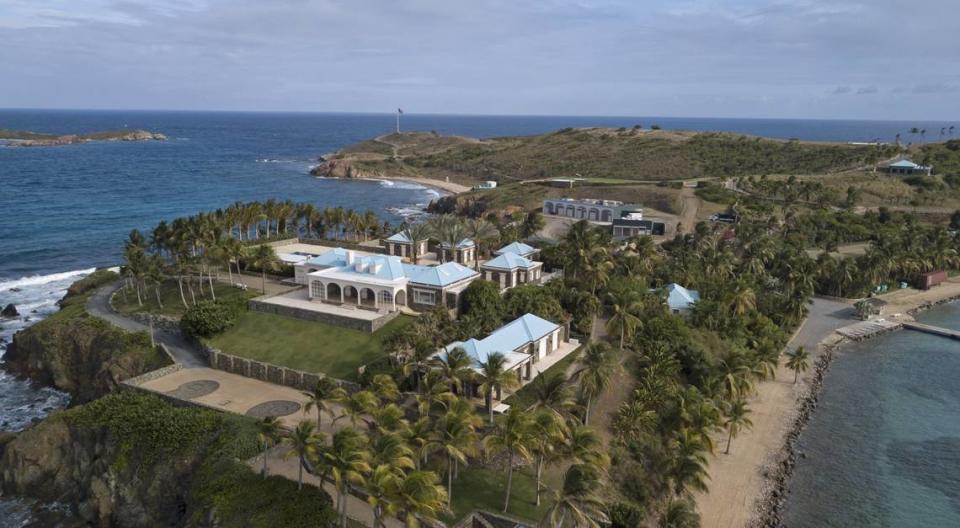JPMorgan will pay U.S. Virgin Islands $75 million to settle Jeffrey Epstein lawsuit
America’s largest bank, JPMorgan Chase, has agreed to pay the U.S. Virgin Islands $75 million in a landmark settlement over allegations that the financial institution benefited from and helped facilitate the sex trafficking of underage girls and women by Jeffrey Epstein.
While JPMorgan admitted no culpability, the settlement — along with other recent bank settlements with Epstein’s victims — could prompt financial institutions to adopt stricter measures to recognize and report suspicious financial activities involving possible human trafficking.
The lawsuit, filed by the USVI against the bank in 2022, revealed devastating details about both JPMorgan’s relationship with Epstein, as well as the U.S. Virgin Islands’ failure to oversee and investigate a convicted sex offender who routinely ferried girls and young women through St. Thomas to his private island on his corporate jet for more than a decade.
Epstein is alleged to have sexually abused more than 200 victims at his various homes around the world, including on his remote island in the USVI, named Little Saint James, and at his estate in Palm Beach. He died in prison in 2019, awaiting trial on sex trafficking charges. His death was ruled a suicide.
Separately, JPMorgan reached a confidential settlement with its former top executive, James “Jes” Staley, who has been accused of hindering the bank’s effort to drop Epstein as a client after learning he was under investigation on sex charges. Staley has denied allegations that he knew about and was in any way complicit in Epstein’s crimes.
Earlier, the USVI also reached a settlement with another Epstein associate, billionaire Leon Black, who paid the territory $62.5 million to avoid any legal claims.
The JPMorgan agreement marks the first time a government has brought a civil action against a bank under federal anti-trafficking laws. It comes just weeks before trial was scheduled in Manhattan and days after the Miami Herald published a story that spotlighted how the USVI was collecting millions of dollars in Epstein-related settlements even though evidence collected during the case showed that it, too, was blind to Epstein’s trafficking for decades.

Ariel Smith, the USVI’s attorney general, had sought $190 million from the bank. Though settling for less than half, she nevertheless hailed the agreement as a victory for Epstein’s survivors, one that sends a powerful warning to financial institutions.
The agreement “should sound the alarm on Wall Street about banks’ responsibilities under the law to detect and prevent human trafficking,” Smith said in a news release.
Spencer Kuvin, who represents nine Epstein survivors, said the victims hope the settlement will stop all enablers — including government authorities, business and academic institutions — from being blinded by money.
“Without the assistance of co-conspirators, as well as financial players, there is no way Epstein would have been able to abuse the victims that he did,” Kuvin said.
About $30 million of the settlement will help support survivors and charitable organizations working to end human trafficking. Another $25 million will be paid to the USVI to boost law enforcement. The remaining $20 million is for the USVI’s legal fees, the bank said. Thus far, the U.S. territory has collected over $240 million in Epstein-related settlements.
“JPMorgan remains committed to previous and ongoing efforts to fight human trafficking through its anti-money-laundering program” and other initiatives, said JPMorgan spokeswoman Trish Wexler.
Since Epstein’s death, his estate has paid $121 million to survivors and another $105 million to the USVI; JPMorgan has paid $290 million to his victims and Deutsche Bank agreed to pay $75 million in a class-action suit brought by victims.
Two of Epstein’s victims have also served notice with the FBI that they intend to file a $600 million class-action lawsuit alleging the agency failed to investigate complaints about Epstein’s sex crimes for two decades.
“We are glad to see JPMorgan has accepted some of their responsibility ... but the one significant entity that continues to skirt responsibility is the FBI,” said Jennifer Freeman, who represents the two victims.
In 2020, an investigation by the U.S. Department of Justice concluded that the U.S. Attorney’s Office in Miami, headed by then-U.S. Attorney Alexander Acosta, “exercised poor judgment” in it failure to federally prosecute Epstein in 2006 on sex trafficking charges. The probe found no evidence of wrongdoing by either prosecutors or the FBI. However, as a result of the U.S. attorney’s secret plea deal, Epstein served a short jail stint and was released, allowing him to continue trafficking victims for more at least another decade.
To this day, only one other person has been criminally charged in Epstein’s sex trafficking operation: British socialite Ghislaine Maxwell, Epstein’s former companion, who was convicted in December 2021 of child sex trafficking and sentenced to 20 years in prison.

